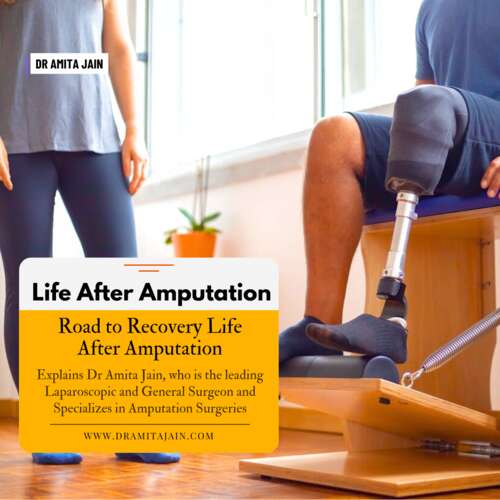Life is unpredictable. Nobody knows what the future has in store for us. But sometimes, life throws curveballs—unexpected challenges that test our strength, resilience, and perspective. For instance, losing any part of your body is a life-altering event that no one truly anticipates.
Whether due to an accident, medical condition, or other circumstances, such a loss can feel overwhelming and deeply personal. The physical challenges are often accompanied by emotional and psychological hurdles, making the journey to acceptance and recovery a complex process. Nevertheless, life must move on.
In this article, Dr Amita Jain, Delhi’s leading laparoscopic and general surgeon discusses how new amputees can navigate the road to recovery and embrace life after such a transformative experience.
What is Amputation and Why is it done?
Amputation is the surgical removal of a body part, such as a limb, finger, toe, or even parts like the ear, nose, or tongue in rare cases. It is performed when the area is severely damaged, diseased, or non-functional. Amputation helps prevent infection, stops the spread of diseases like cancer, and may allow for prosthetics to restore function and improve appearance, enhancing overall health.
Before Amputation
Before amputation surgery, healthcare providers assess your condition and explore alternatives like limb salvage surgery if possible. If amputation is necessary, a detailed plan is created based on your evaluation. This procedure represents a major life change, requiring both physical and psychological care. A multidisciplinary team, including therapists and prosthetists, supports your preparation and recovery, ensuring a comprehensive approach, including discussions on prosthetic limb options for effective healing.
After Amputation
After amputation, you’ll spend a few days to weeks in the hospital, where your recovery will be closely monitored by the healthcare team. You may have oxygen, fluids through an IV, and pain control as necessary, while a urinary catheter and bedpan help avoid the need to get up. The first day after surgery may be the toughest as you adjust, and you will need to wear compression garments to control swelling while staying in an elevated, upright position. Physical therapy will begin soon to prevent stiffness, and regular check-ins will ensure proper healing and manage any side effects. Once recovery progresses, stitches will be removed by hand specialists, and detailed aftercare instructions will be provided for smooth recovery.
The recovery after amputation involves both physical and emotional adjustments. It’s not just about losing a limb but learning to live with the changes in your body. The recovery process is supported by physical therapy and rehabilitation, which aim to build strength and independence. While it can be difficult at first, it’s a crucial step toward regaining functionality.
Your rehabilitation may include:
Physical therapy: You’ll need to move regularly to prevent stiffness and relearn how to use different muscles.
Occupational therapy: An occupational therapist will help you adapt to your new body, teaching you how to manage everyday tasks at home and work.
Psychotherapy: Amputation can be emotionally challenging. Speaking with a mental health professional can help you process your feelings and support your mental health.
Prosthesis fitting and training: If you use a prosthetic, you’ll go through a fitting process and spend time learning how to use it effectively.
Emotional Recovery
Emotional recovery is as important as physical recovery after amputation surgery, involving mourning, loss, sensation-related concerns, body image adaptation, and societal perceptions. Negative thoughts and feelings are normal during this time, and counselling or psychotherapy can be beneficial. Accepting the reality of amputation, especially after a sudden or severe event, is challenging, making emotional support essential throughout the recovery process. Psychological interventions such as short-term psychotherapy, cognitive behavioural therapy, mindfulness meditation, relaxation training, and group therapy can help manage depression and anxiety, common during healing. It’s important to discuss realistic goals and expectations with your doctor to avoid pitfalls when your perceptions of life don’t align with the reality of your situation. Emotional and community-based support from family, therapists, or support groups can make a significant difference in the recovery journey.
Use of Prosthetics
It is not correct to think that everyone who undergoes amputation requires a prosthetic device. The decision depends on various factors, including the type of amputation, age, health, and fitness levels. While leg prosthetics can restore mobility, arm prosthetics, especially those with advanced technology, can enable fine motor skills. Children with congenital limb loss often adapt well, while older individuals or those with chronic conditions may face challenges.
Embracing recovery, both physically and emotionally, is a journey. With proper support, therapy, and perseverance, new amputees can rebuild their lives and thrive in their new reality. After all, your life is not defined by what you have lost, it’s defined by what you choose to do with what you have.

Dr Amita Jain is a surgeon with the highest degree of professional competence, precision and surgical craftsmanship. Performed all complicated general surgery procedures with in depth knowledge of invasive and few minimal invasive and onco surgical techniques. Underwent special training in trauma, executed various trauma-related complex life-saving neurosurgical procedures, reconstructed injured mangled limbs and performed vascular and reconstructive procedures with critical care.
Dr Amita Jain holds 28 plus years of rich experience in Trauma and General Laparoscopic Surgeries (including Gallbladder stone removal, appendix removal, hernia repair surgery, piles and fissure surgeries). She was the Professor Surgery of at the Army College of Medical Sciences and Base Hospital Delhi Cantt. In 1994 she was commissioned as Surgeon under the United Nations Mission in Congo. From 2020 to 2022, she worked with Bansals Hospital. Currently, Dr Amita Jain is the Senior Consultant, (Speciality: General and Laparoscopic Surgeon) at Artemis Lite Hospital, New Delhi and Sr. General and Laparoscopic Surgeon at Rainbow Children Hospitals, Malviya Nagar, Delhi.
